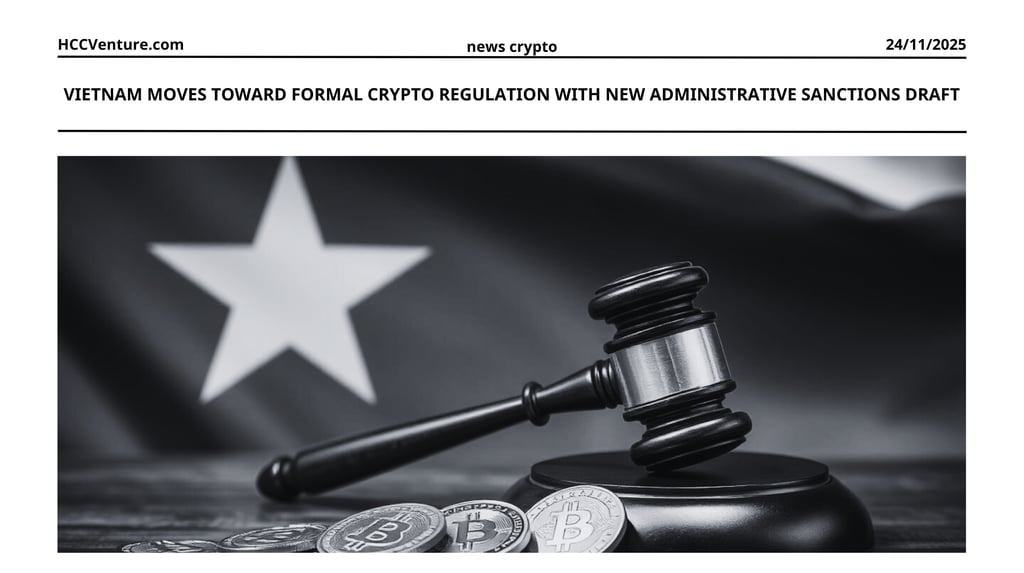Vietnam Moves Toward Official Crypto Regulation With Draft Penalty Order
The Vietnamese Ministry of Finance and the State Securities Commission (SSC) are seeking comments on the draft Decree regulating administrative sanctions for violations in the field of crypto assets and the Crypto market.
11/24/20253 min read


Latest draft law report
According to a new report, the Ministry of Finance (MoF) and the State Securities Commission (SSC) are officially seeking public feedback on a draft Decree regulating administrative sanctions for violations in the crypto-asset sector.
One of the most significant legal developments in Vietnam’s digital asset sector to date, it marks the first time the government has issued a comprehensive framework outlining specific violations and corresponding penalties in the cryptocurrency market.
The move reflects Vietnam’s recognition of the growing scale of digital asset activity and the need for a unified legal framework to mitigate risks, improve market integrity, and prepare for future licensing structures.
What violations are handled?
The draft Decree identifies a range of administratively sanctionable violations. These violations cover the entire lifecycle of digital asset operations — from issuance to trading, custody and compliance.
Violations in the Offering and Issuance of Crypto-assets
This category targets unauthorized token issuances, unapproved ICOs/IDOs, misleading fundraising activities, and token distributions that violate disclosure or investor protection rules.
Violations in the Organization of Cryptocurrency Asset Trading Market
This applies to unlicensed exchanges, OTC units, liquidity centers or trading platforms that operate without approval or do not meet Vietnamese market standards.
Breach of Responsibility of Cryptocurrency Service Provider
Including custodial services, wallet operators, consulting firms and any entity involved in storing, managing or facilitating cryptocurrency transactions that do not comply with mandatory obligations.
Violations in Foreign Investors' Money Transfer
Foreign entities operating in Vietnam's cryptocurrency market must comply with capital flow rules; Violations include illegal money transfers, cross-border money transfers or circumvention of capital controls.
Violation of AML/CTF and Non-Proliferation Requirements
Including failure to: implement KYC/AML systems, report suspicious transactions, monitor terrorist financing risks, prevent misuse of digital assets for illegal purposes.
Other violations
A flexible, all-encompassing category that allows enforcement even as the crypto industry evolves — including misleading advertising, false disclosures, market manipulation, or failure to cooperate with authorities.
Warning or "Soft Punch"?
The application handles two current forms of sanctions: Warnings or Fines, with a maximum
Individual: 100 million VND (~4,000 USD).
Organization: 200 million VND (~8,000 USD).
This penalty may increase the level of violation (e.g. x2 for repeat offenses), but compared to the scale of global cryptocurrency fraud (hundreds of millions of USD), it is considered "light". For example, the largest cryptocurrency fraud in Vietnam in 2024 (more than 1,000 billion VND) was only punished for the main act, leading to debate about the deterrent effect.
While modest compared to traditional financial penalties, these fines serve as an initial enforcement framework — and could be expanded once a full licensing and monitoring regime is in place.
Vietnam's Regulatory Progress
Vietnam has historically taken a cautious stance toward cryptocurrencies, issuing only warnings and avoiding outright legalization or licensing. However, the domestic market is large, vibrant, and growing rapidly — with strong activity in:
Spot trading
Peer-to-peer (P2P) money flow, OTC brokerage
DeFi and NFT ecosystem participation, Web3 games.
The draft Decree shows that Vietnam is moving from “grey zone supervision” to a more structured regulatory mechanism. Key implications include:
Establish Legal Boundaries.
Laying the Foundation for Future Licensing.
Administrative sanctions are often the first step before issuing exchange licenses, custody approvals, and AML reporting standards.
Strengthening Consumer Protection.
Complies with global AML/CTF standards.
The draft reflects Vietnam's commitment to meeting FATF requirements on digital asset supervision.
Disclaimer: The information presented in this article is the author's personal opinion in the cryptocurrency field. It is not intended to be financial or investment advice. Any investment decision should be based on careful consideration of your personal portfolio and risk tolerance. The views expressed in this article do not represent the official position of the platform. We recommend that readers conduct their own research and consult with a professional before making any investment decisions.
Explore HCCVenture group
HCCVenture © 2023. All rights reserved.

Connect with us
Popular content
Contact to us
E-mail : sp_contact@hccventure.com
Register : https://linktr.ee/holdcoincventure
Disclaimer: The information on this website is for informational purposes only and should not be considered investment advice. We are not responsible for any risks or losses arising from investment decisions based on the content here.


TERMS AND CONDITIONS • CUSTOMER PROTECTION POLICY
ANALYTICAL AND NEWS CONTENT IS COMPILED AND PROVIDED BY EXPERTS IN THE FIELD OF DIGITAL FINANCE AND BLOCKCHAIN BELONGING TO HCCVENTURE ORGANIZATION, INCLUDING OWNERSHIP OF THE CONTENT.
RESPONSIBLE FOR MANAGING ALL CONTENT AND ANALYSIS: HCCVENTURE FOUNDER - TRUONG MINH HUY
Read warnings about scams and phishing emails — REPORT A PROBLEM WITH OUR SITE.
